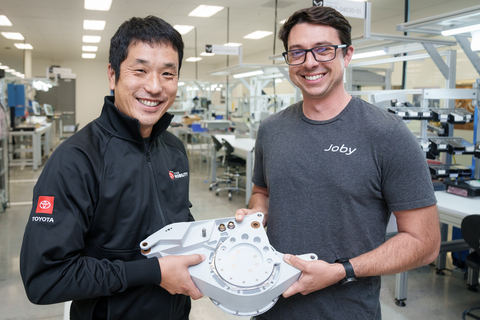Joby Aviation, Inc. (NYSE:JOBY), a company developing all-electric aircraft for commercial passenger service, today announced it has signed a long-term agreement with Toyota Motor Corporation Inc. (NYSE:TM) to supply key powertrain and actuation components for the production of the Company’s aircraft.
This press release features multimedia. View the full release here: https://www.businesswire.com/news/home/20230427005327/en/

Kazuhiro Sato (left) and Jordi Gischler (right) present a completed tilt actuator, manufactured at Joby’s San Carlos production facility with key parts supplied by Toyota. (Photo: Joby Aviation)
The agreement builds on the long-standing partnership between Joby and Toyota, which has seen the two companies collaborate on a wide variety of projects to support the production and assembly of the Joby aircraft, including advising on the design of Joby’s pilot production line in Marina, CA. Toyota is also Joby’s largest external shareholder, having invested around $400 million in the Company.
JoeBen Bevirt, founder and CEO of Joby, commenting on the agreement, said: “Our partnership with Toyota continues to be an integral part of Joby’s success, from assisting in the design of our pilot production line in Marina, California, to supplying key components for our aircraft.”
“I’m grateful for Toyota’s unwavering dedication to Joby as we work together to deliver a new form of fast, quiet and emissions-free mobility for cities and communities around the world. Their expertise and knowledge has helped put us on track to deliver, at scale, an aircraft that we believe is truly best-in-class.”
The components, designed by Joby and manufactured by Toyota, will be delivered to Joby’s powertrain and electronics manufacturing facility in San Carlos, California, before the finished assemblies are shipped to the Company’s pilot production line in Marina for integration. Intended to prove out scalable tooling and processes at low volumes in advance of aircraft production at full scale, Joby’s Marina facilities were designed with Toyota’s help, leveraging decades of experience delivering reliable, high-quality cars at high volume.
Toyota Motor Corporation Connected Company President Keiji Yamamoto added: “We are very pleased to have reached this milestone with our key partner. Our mutual goal is mass production of eVTOL and helping Joby apply the best practices of the Toyota Production System in meeting high quality, reliability, safety, and strict cost standards.
“We are excited about the potential for further collaboration as we seek to realize Mobility for All with a seamlessly integrated air-to-ground mobility network.”
Joby is working with Toyota subsidiary Aero Asahi on an air taxi shuttle service for Toyota related passengers in Japan. Joby recently announced it has formally applied to the Japan Civil Aviation Bureau (JCAB) to validate its planned Federal Aviation Administration (FAA) aircraft type certification.
About Joby
Joby Aviation, Inc. (NYSE:JOBY) is a California-based transportation company developing an all-electric, vertical take-off and landing aircraft which it intends to operate as part of a fast, quiet, and convenient service in cities around the world. To learn more, visit www.jobyaviation.com.
Forward Looking Statements
This press release contains “forward-looking statements” within the meaning of the “safe harbor” provisions of the Private Securities Litigation Reform Act of 1995, including but not limited to, statements regarding the development and performance of our aircraft, the growth of our manufacturing capabilities, our regulatory outlook, progress and timing; and our business plan, objectives, goals and market opportunity; plans for, and potential benefits of, our strategic partnerships. You can identify forward-looking statements by the fact that they do not relate strictly to historical or current facts. These statements may include words such as “anticipate”, “estimate”, “expect”, “project”, “plan”, “intend”, “believe”, “may”, “will”, “should”, “can have”, “likely” and other words and terms of similar meaning in connection with any discussion of the timing or nature of future operating or financial performance or other events. All forward-looking statements are subject to risks and uncertainties that may cause actual results to differ materially, including: our ability to launch our aerial ridesharing service and the growth of the urban air mobility market generally; our ability to produce aircraft that meet our performance expectations in the volumes and on the timelines that we project, and our ability to launch our service; the competitive environment in which we operate; our future capital needs; our ability to adequately protect and enforce our intellectual property rights; our ability to effectively respond to evolving regulations and standards relating to our aircraft; our reliance on third-party suppliers and service partners; uncertainties related to our estimates of the size of the market for our service and future revenue opportunities; and other important factors discussed in the section titled “Risk Factors” in our Annual Report on Form 10-K, filed with the Securities and Exchange Commission (the “SEC”) on March 1, 2023, and in future filings and other reports we file with or furnish to the SEC. Any such forward-looking statements represent management’s estimates and beliefs as of the date of this presentation. While we may elect to update such forward-looking statements at some point in the future, we disclaim any obligation to do so, even if subsequent events cause our views to change.
View source version on businesswire.com: https://www.businesswire.com/news/home/20230427005327/en/
Contacts
Joby Aviation
Investors:
investors@jobyaviation.com
Media:
press@jobyaviation.com
